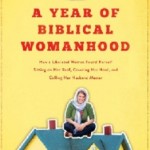 Rachel Held Evans’ new book, A Year of Biblical Womanhood is getting a bunch of press, which I’m glad about. There’s a lot of predictable internet bickering going on, a lot of posturing and arguing and name-calling, some pointed and snarky responses and some responses full of grace. Some of the evangelical crowd is yelling about the book being a “mockery” of the Bible. Even some more progressive, neo-evangelicals and emerging Anabaptists are pretty inhospitable to the idea – though I’m not convinced they’ve actually read the book OR much of Rachel’s blog.
Rachel Held Evans’ new book, A Year of Biblical Womanhood is getting a bunch of press, which I’m glad about. There’s a lot of predictable internet bickering going on, a lot of posturing and arguing and name-calling, some pointed and snarky responses and some responses full of grace. Some of the evangelical crowd is yelling about the book being a “mockery” of the Bible. Even some more progressive, neo-evangelicals and emerging Anabaptists are pretty inhospitable to the idea – though I’m not convinced they’ve actually read the book OR much of Rachel’s blog.
Honestly, I find most of that conversation silly. I don’t come from those circles where women in leadership is still an all-consuming and contentious subject. I’m not really invested in arguments about women’s roles or what biblical womanhood may or may not be. I like the book, and I like Rachel, not because she’s a woman or because she’s writing about women but because a) she’s funny and b) the way she incorporates an online community into her writing is fascinating and phenomenal.
When I say funny, I mean: laugh-out-loud, guffawing in the middle of the studiously quiet Starbucks kind of funny. Rachel is self-effacing in ways that I can identify with, she references everything from Anne of Green Gables to Arrested Development, and her ability to play off the mad-dash contemporary pop culture against the molasses pace of down-home Dayton, Tennessee is delightful. A scene near the beginning of the book in which Rachel attempts to purchase cipollini onions in an East Tennessee Wal-Mart nearly knocked me off my chair.
But what really intrigues me is the way that Rachel has been able to create space on the internet for real, sustained, honest conversation among people of widely varying theological stripes…and then somehow incorporate that communal discussion so gracefully into her in-print writing.
First: the blog. Rachel’s blog is built for conversation. I’ve been involved in several online blog-based initiatives meant to spark discussion, and none have been uber-successful. Whether we skewed the pieces too theological or aimed them at a too narrow audience, readership was high but participation was very, very low. I think people are often hesitant to participate online because of the dangers of being misinterpreted and because they’re wary that any conversation on the internet will devolve into name-calling and triviality. Surely, the prevalence of Facebook and Twitter debate has not eased anyone’s mind on that front.
But Rachel somehow creates and nurtures space that is meant to be about interaction, and healthy, productive interaction at that. The comment sections are long and encouraging – people actually engage the substance of one another’s comments. There’s very little snarking back and forth at one another.
The content itself is carefully planned and directed by readers. She regularly hosts guest writers in an “Ask A…” feature, where readers submit suggestions for the guests as well as their particular questions. The space has hosted funeral directors, transgendered Christians, Mennonites, messianic Jews, feminists, pagans, Pentecostals, and nuns, to name a few. Readers ask honest questions, and writers answer with openness and grace. Real conversation!
This sense of graceful community comes through in the book. Rachel writes about sharing the experience of her writing project with blog readers. She tweets for help in the kitchen, asks her readers about tips for baking challah, and surveys the blogosphere for perspective on motherhood. It is clear, reading the book, that while the hard work of writing (and experimenting: Rachel is definitely the one who slept in a tent during her period, abstained from cutting her hair for a year, and called her husband “master” for a month.) were done by one person, the authorship of this book is shared.
I’m not sure exactly what that means yet, literarily or theologically. But I like where it’s headed. I like that we can use technology to open space for communal conversation and discernment. I like that a book can be written together: not by committee, but by community. I like that this book and this blog are places where multiple voices not only get heard, but are engaged, regularly. I like that when I tweeted about guffawing while reading, Rachel saw it immediately and re-tweeted so that my experience of reading alone in a coffee shop was transformed into a shared celebration. I like that, as we Brethren say, discernment comes through scripture-read-in-community, and this book is an example of both creation and experience done just that way.
And in some strange, meta-level twist of the Spirit’s movement, I think that’s exactly the point that Rachel was trying to make: no work of art is pure and singular. Not even the Bible, revered as it may be, is a monolithic monotone dictation from God. It is a collection, a conversation, a squawking cacophony of voices that don’t really make sense until we agree to create some space for them to speak to one another in grace. Maybe that’s what the canon is, maybe that’s what the church is, maybe that’s what we are to be about. Thanks to Rachel for clearing away some of the clutter and getting the discussion started. Eshet chayil! Woman of valor!
 Dana Cassell serves as Minister for Youth Formation at the Manassas Church of the Brethren in Manassas, Virginia, as well as Staff for Ministry Formation in the Church of the Brethren Office of Ministry. She blogs at Authenticity.
Dana Cassell serves as Minister for Youth Formation at the Manassas Church of the Brethren in Manassas, Virginia, as well as Staff for Ministry Formation in the Church of the Brethren Office of Ministry. She blogs at Authenticity.

